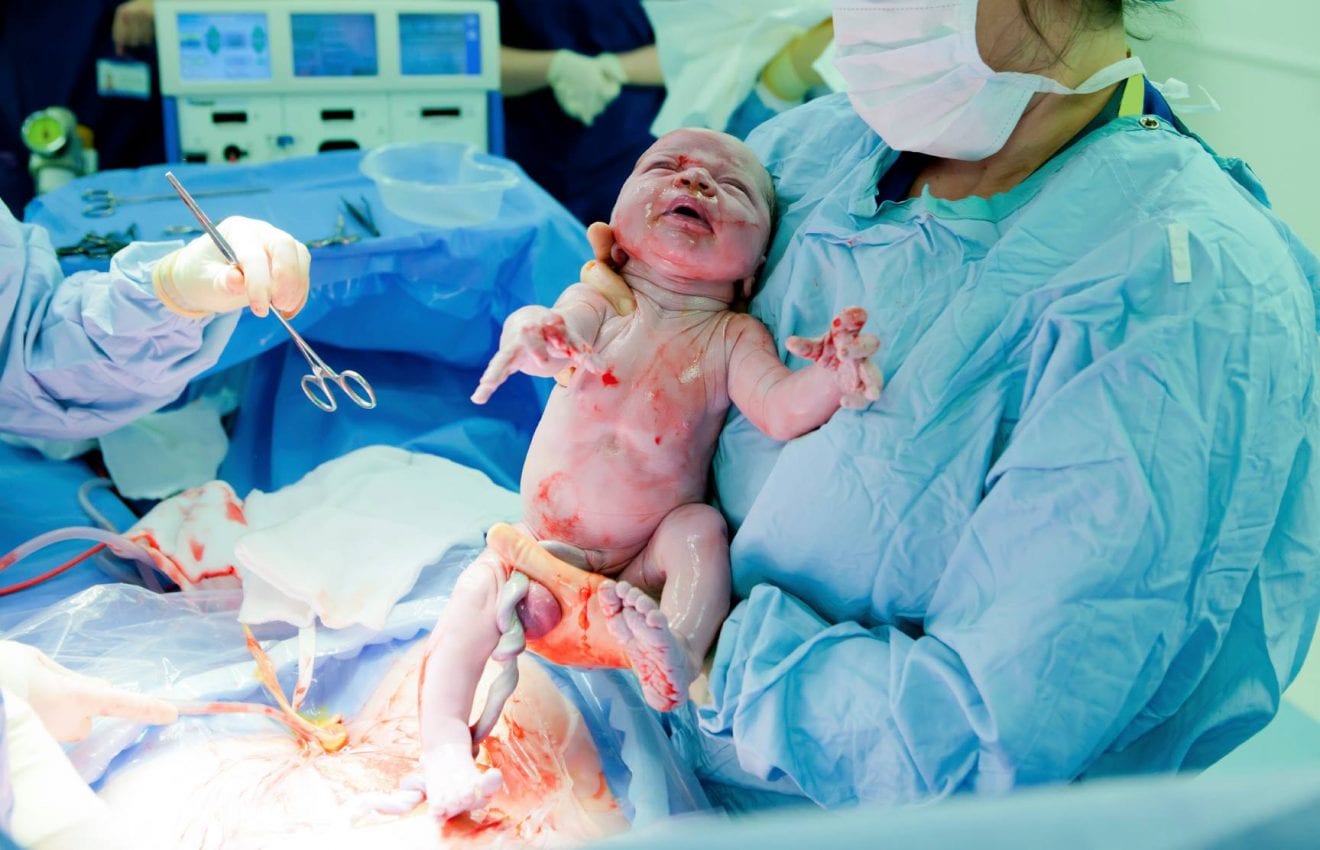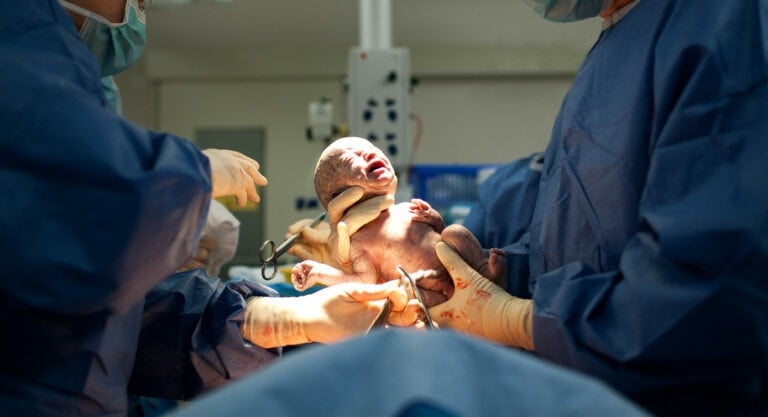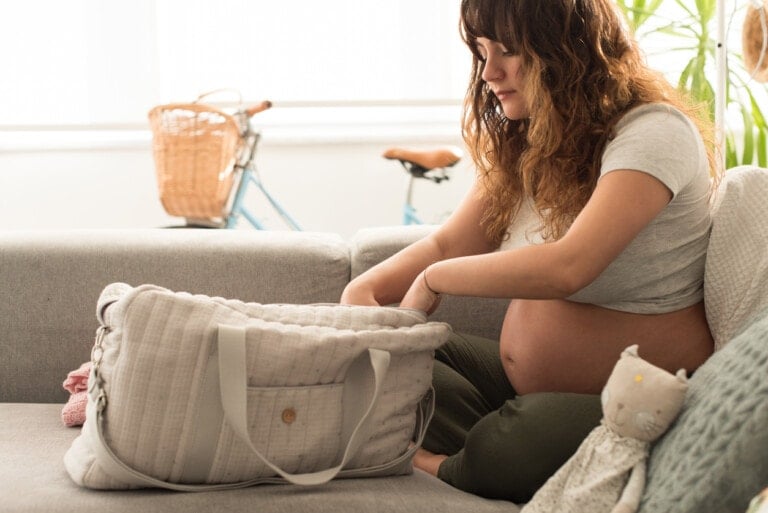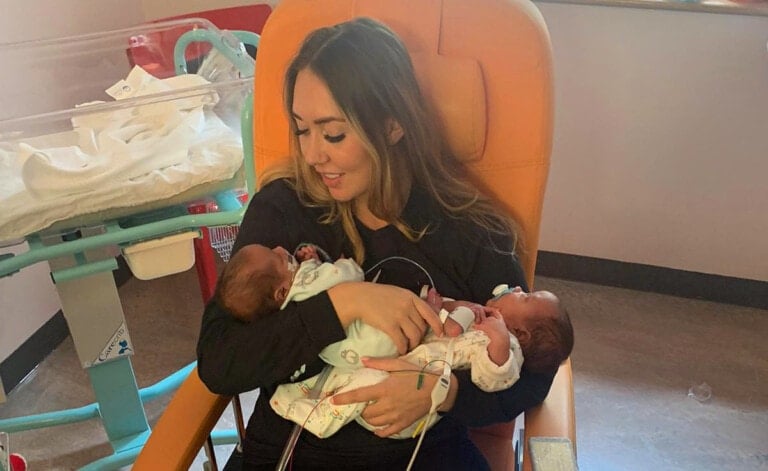There are multiple reasons why a woman may have a cesarean birth. It could be a planned C-section (either by medical necessity or preference/choice) or unplanned (an emergency C-section).1 If you prefer to have your baby via C-section rather than vaginally, you will have time to plan it out and become prepared for the big day. If your baby is breech or you have placenta previa, you will have a few days (or maybe a week or two) to prepare mentally. But if an emergency happens, like placental abruption or cord prolapse, you won’t have the time to plan and prepare.
If you’re anything like me, I always like to be prepared no matter the situation. This is why I think every expecting mama should take the time to review what might happen during her birth and understand her options every step of the way. Then, she can decide what she would prefer to happen before, during, and after the operation. Once you learn and understand more about what you can expect and your options, you will probably have preferences on what occurs. It’s always easier to tell your medical team to ignore certain aspects of your birth plan (if you can have a vaginal birth) rather than make on-the-spot decisions about what you want to happen as you go along. So, it’s a good idea to have a C-section plan on your birth plan.
Before Surgery
If you want to become more prepared for a C-section birth, whether planned or unplanned, there are a few things to consider when deciding what kind of experience you want. Here are some birth preferences to think about before the surgery:
Pain Relief
- Do you want a regional anesthetic (like an epidural or spinal) that numbs your belly and legs and means you can stay awake for the operation?2 (This is usually women’s first choice.3)
- Do you want a general anesthetic, which means you will be asleep during the operation?4
- Do you even have a choice about what type of pain relief you can receive during a C-section? Certain health conditions can make regional anesthetics riskier for the mother.5 A general anesthetic may be preferable for mothers with one or more of these conditions, which include:5,6
- Bleeding disorders
- Blood clotting disorders
- Blood infections
- Skin infection on the lower back
- Neurological problems
- Severe scoliosis
- Severe preeclampsia
- Cardiac diseases, such as aortic stenosis or hypertrophic obstructive cardiomyopathy
- Are you okay with the medical staff adding sedatives or tranquilizers to your anesthesia if necessary? Would you want to be asked or (if you’re incapacitated) your partner to be asked for permission/consent before administering?
Birth Partner
- If you have a regional anesthetic, your partner should be able to join you once they’re ready to begin the operation (not during the prep), and they should be able to stay with you through the end of the operation. Do you want your partner, a family member, or a doula in the room with you? (Read more about hiring a doula for a cesarean birth.)
- If you’re under general anesthetic, the obstetrician probably will not allow your partner into the operating room. (Be sure to ask your doctor, though.) If your doctor says no, ask if your partner can be outside the O.R. door so they can hold your baby as soon as possible, if that’s important to you.
Other People in the Room
- Are you okay with any students, interns, etc., watching or participating during your C-section? Sometimes, they will assist and even perform the entire operation. This is why you should be aware, ask your doctor, and let them know your preferences.
- Would you want your doula or a birth photographer to join you during the operation and post-birth?
Ambiance
- Do you want a running commentary from the medical staff about how your operation is going?
- Do you want music playing in the background to relax you and take your mind off the operation?
- Do you want the staff and the operating team to be quiet so that the first voice your baby hears is yours or your partner’s voice?
Other
- Many doctors routinely tie down both of your arms to make sure they’re controlled and don’t touch the sterilized drape or knock down the screen. Are you okay with that? Do you prefer to have one arm untied so you can hold your baby, or do you want both to be free?
- Do you want warm blankets during your surgery?
During Surgery
Here are some questions to help you consider your preferences during the birth and immediately post-birth for a C-section:
The Birth
- Do you want the screen lowered a bit or have a mirror provided so you can see your baby being born or see them immediately after birth?
- Do you want the screen to stay raised until your incision is sewn up?
- Do you want someone to take photos or a video once your baby is born?
Immediate Post-Birth
- Do you want to discover the sex of your baby for yourself (not have the medical staff say) or have the medical team tell you? (Some of my clients like to see the baby raised and have the partner announce the gender.)
- Would you like to have immediate skin-to-skin contact with your baby, or would you like to wait for your baby to be cleaned/ wiped down before you cuddle? (If you want immediate skin-to-skin, APGAR testing can be performed while the baby is on your chest.7)
- Do you want to breastfeed your baby as soon as possible, or do you want to wait until you’re in your recovery room or postpartum room? Or would you prefer that your partner bottle-feeds your baby while you recover?
- Would you like the nurse to put your baby’s footprints inside a baby book you provide?
- Do you want your baby to remain on your chest or in your arms throughout suturing, recovery, etc.?
- Would you like them to repair your uterus and use dissolvable stitches, Steri-Strips, or Dermabond instead of staples?
After Surgery
Finally, here are several questions for your birth plan to determine your preferences after the C-section occurs:
Post-Procedure
- Once you’re in your recovery room or postpartum room, do you want to have your baby with you or your partner at all times, or would you like baby to go to the nursery?
- Do you want your partner to stay with you if your baby is admitted to the NICU (neonatal intensive care unit), or do you want your doula or family member to stay with you?
- Would you like to breastfeed on demand and have help (by seeing an on-staff lactation consultant), or would you want help with formula feeding?
- Are you okay with the nursing staff giving your baby a pacifier or supplementing your baby with formula while you sleep (if you don’t want them to wake you up)?
- If you were under general anesthesia, who would you want to introduce your baby to you? Your partner, your mother, your doctor, your nurse, etc.?
- Do you want to give your baby their first bath? (Obviously, you’d have assistance during the process.)
- Sometimes, mothers have to request oral post-op medication while at the hospital. Would you like your orders to be written for you and to be woken up for timely doses, or would you rather have them wait for your request?
- Do you want a binder to wear for abdominal support? (I highly recommend it!)
- Would you prefer your partner to stay with the baby at all times if you can’t be there?
- Do you want the pediatric exams done in your room or the nursery?
I hope these questions brought to light some things you may want to consider and specify on your birth plan for your C-section (if you have one). For more advice, be sure to check out my tips for creating your birth plan. Happy prepping!































